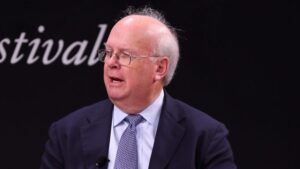The Dictatorship
Britain’s once-mighty Conservative Party battling to avoid extinction…
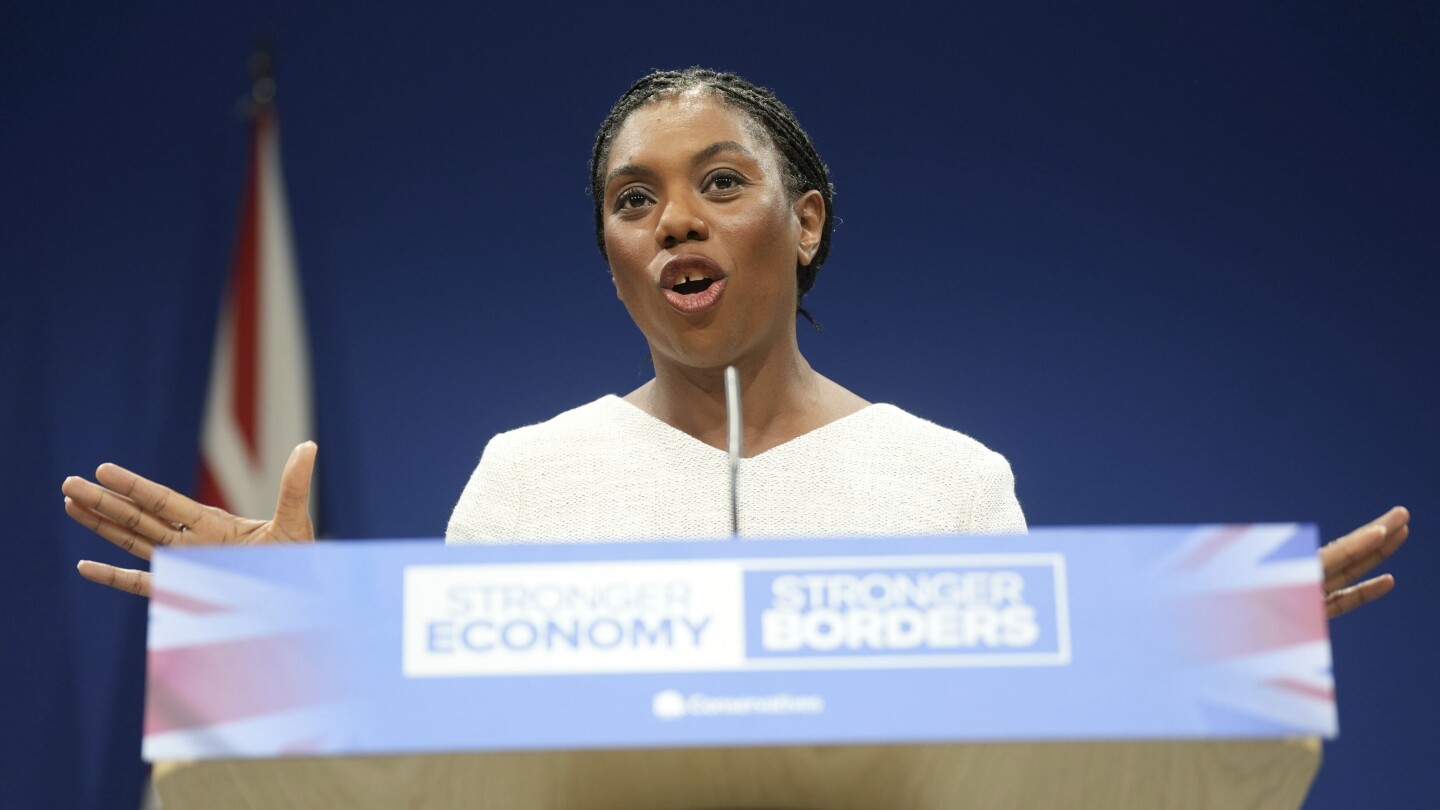
MANCHESTER, England (AP) — Britain’s Conservatives used to boast they were the world’s most successful political party. Not anymore.
The center-right party that governed the U.K. for more than 60 of the last 100 years before being ousted in 2024 is embracing Donald Trump -style policies, including mass deportations and government budget-slashing, as it battles to remain a contender for power.
The Tories are fighting not just the Labour government to their left, but Reform UK to the right. Nigel Farage’s hard-right party has topped opinion polls for months, trounced the Conservatives in May’s local elections and has welcomed a stream of defecting Tory members and officials.
Conservative leader Kemi Badenoch acknowledged that the party has “a mountain to climb” to win back voters.
But in a speech closing the party’s annual conference on Wednesday, she insisted the Conservatives are “the only party that can meet the test of our generation, the only party that can deliver a stronger economy and stronger borders.”
A shrunken party
Crowds were thin under the vast vaulted roof of the Manchester Central conference venue, a former railway station in the northwest England city, as delegates absorbed the party’s diminished stature.
“It’s not in a great place at the moment, we’re aware of that,” said Neil McCarthy, a member from northern England. “There needs to be passion, and we need to get the message across that we’ve changed.”
Questions of party competence weren’t helped by Conservative-branded chocolate bars distributed at the conference on which Britain was misspelled as “Britian.”
The Conservatives have endured years of turmoil – some of it of their own making, some of it shared by incumbent parties in a world of economic and geopolitical instability.
The economic benefits of Britain’s 2020 exit from the European Union, championed by those now running the party, have been elusive. Prime Minister Boris Johnson won a huge election victory in 2019 but was ousted by the party in 2022 after a string of ethics scandals.
His successor, Liz Trusssent inflation and interest rates soaring with a disastrous tax-cutting plan that wrecked the Conservatives’ reputation for economic stability.
Under Rishi Sunakthe government staggered on until the July 2024 election that delivered the Conservatives’ worst-ever defeat.
Badenoch, a small-state, low-tax advocate elected leader last year, has shifted the party to the right, announcing policies with a distinct MAGA flavor. She says a Conservative government will scrap carbon emissions reduction targets, sharply cut legal immigration and deport 150,000 unauthorized immigrants a year with a removals force similar to Immigration and Customs Enforcement in the U.S. It would also leave the European Convention on Human Rights and limit the power of judges to block the will of government.
Such policies, which alarm civil liberties groups, are similar to Farage’s plans for power, leading some to ask what sets the Conservatives apart from Reform.
Badenoch says the difference is fiscal prudence. She rejected Farage’s promises to increase welfare spending and nationalize key industries such as steel, and said a Conservative government would slash welfare spending to fund lower taxes on businesses and homebuyers.
Jill Rutter, a senior fellow at the Institute for Government think tank, said Badenoch’s attempt to make the Tories “Reform with better economics” risks “narrowing the appeal” of the party.
“Basically, she’s chucking quite a lot of people out of the Conservatives’ broad church,” Rutter said.
Climate-change targets, human rights rules and support for managed immigration were until recently mainstream Conservative positions, and some party members are uncomfortable with the rightward turn.
“I don’t think a lurch to the right is necessarily the solution,” said Elizabeth Rhodes, from Knutsford in northwest England. “I think the Conservative Party has always been a coalition, and if we are going to win again, we’ve got to (still) be.”
British Shadow justice secretary Robert Jenrick gives an interview during the Conservative Party Conference at the Manchester Central Convention Complex, in Manchester, England, Tuesday Oct. 7, 2025. (Peter Byrne/PA via AP)
British Shadow justice secretary Robert Jenrick gives an interview during the Conservative Party Conference at the Manchester Central Convention Complex, in Manchester, England, Tuesday Oct. 7, 2025. (Peter Byrne/PA via AP)
Leadership doubts
The government does not have to call an election until 2029, but Badenoch’s poor poll ratings and lackluster performance in Parliament have stirred speculation that she may be ousted long before then.
Prime Minister Keir Starmer faces similar discontent within his Labour Party as Reform destabilizes parties of both left and right.
Conservative lawmaker Robert Jenrick, who lost the 2024 leadership contest to Badenoch, has spent the ensuing months building his online brand, with one popular social media video showed him confronting subway fare-dodgers. He has become one of the party’s loudest anti-immigration voices.
Video published online by The Guardian newspaper showed him remarking that he “didn’t see another white face” in a neighborhood in Birmingham. Jenrick said he was not being racist in expressing concern about “ghettoized communities” and lack of integration.
Jenrick drew large crowds at his conference appearances, where he said the Conservative Party needs to show more “hunger,” while insisting he is loyal to Badenoch.
“The party made its choice,” he said. “Kemi is our leader.”
Jenrick hasn’t ruled out running for leader again, or making a unite-the-right electoral pact with Reform, an idea Badenoch rejects.
Conservative Party leader Kemi Badenoch during the Conservative Party Conference at the Manchester Central Convention Complex, Manchester, England, Sunday Oct. 5, 2025. (Danny Lawson/PA via AP)
Conservative Party leader Kemi Badenoch during the Conservative Party Conference at the Manchester Central Convention Complex, Manchester, England, Sunday Oct. 5, 2025. (Danny Lawson/PA via AP)
Memories of Margaret Thatcher
Facing an uncertain future, many Conservatives are retreating to their happy place: the 1980s, when Prime Minister Margaret Thatcher transformed Britain with her free-market policies.
The Manchester conference hall sported life-size cardboard Thatcher cutouts, tables stacked with biographies of the late leader and bottles of Thatcher whisky for 85 pounds ($114) each. Delegates could dance to 1980s hits at a “retro disco-themed club night celebrating Margaret Thatcher.”
David Davis, a Conservative lawmaker since 1987, said Badenoch could still revive the party as Thatcher once did.
“In the late ‘70s she was being talked down, too, for precisely the same reasons: a bit too tough, a bit too hard-edged, a bit too dangerous, the policies,” Davis said. “But then we had the (financial) crisis and suddenly Thatcher was the right answer.
“We’re going to have another crisis, and Badenoch will be the right answer too.”
The Dictatorship
The two words Democrats are avoiding in praising the Israel-Hamas peace deal
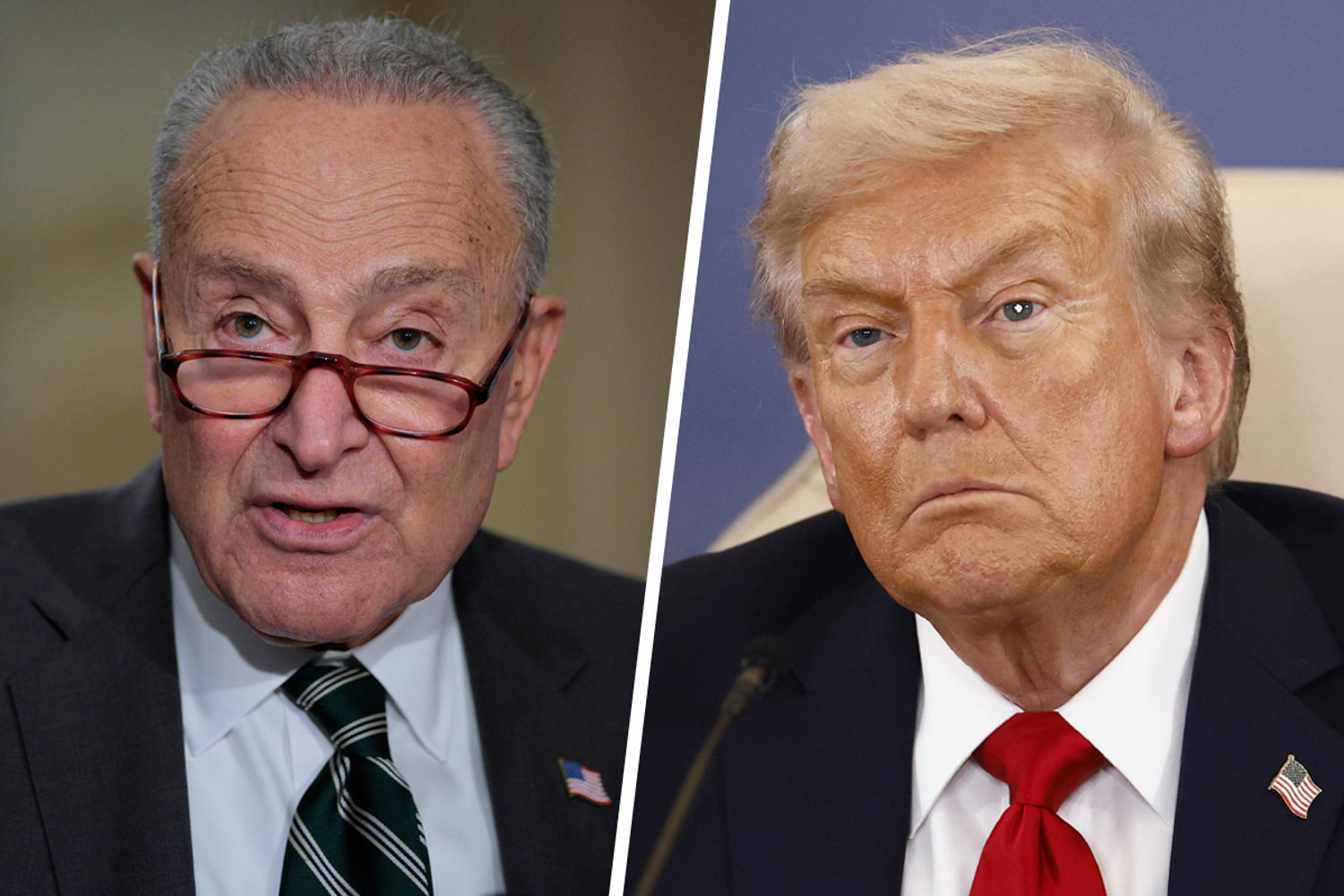
Democrats are heaping praise on the peace deal struck between Israel and Hamas, which unlocked the release of all living hostages in Gaza. But there are two words most Democrats are omitting when discussing the peace agreement: “Donald” and “Trump.”
In statement after statement, Democrats on Capitol Hill lauded the end to the fighting, the liberation of hostages and the hope of a new chapter in the Middle East, applauding “all involved in succeeding to broker the ceasefire agreement” and touting the “power of diplomacy” for getting the globe to that moment.
“After two years of abduction and torture, every living hostage is finally home. Those who were taken on October 7th will outlast the terrorist organization that tore them from their families and homes and unleashed a war of untold suffering,” Rep. Ritchie Torres, D-N.Y., wrote on social media. “Against all odds, the timeless call to ‘Let My People Go’ has been answered.”
Notably, however, there was no mention of Trump.
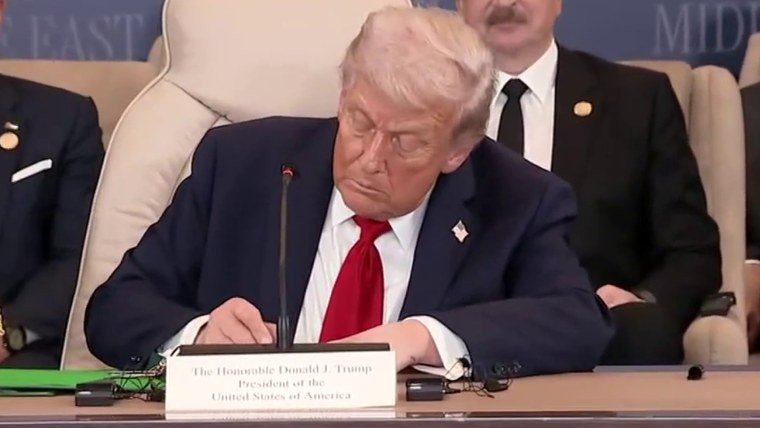
The same could be said for Minority Leader Hakeem Jeffries, D-N.Y.
Jeffries called the agreement “an extremely welcome development.”
“The world will be a better place with a safe and secure Israel living side by side in peace and prosperity with the Palestinian people able to achieve the dignity and self-determination they deserve. We must all recommit to achieve that outcome,” Jeffries said.
Senate Minority Leader Chuck Schumer, D-N.Y., eventually gave Trump a shout-out Monday afternoon, after ignoring the president’s role when the deal was first announced.
In a 175-word statement, Schumer commended “the enormous advocacy of the tireless hostage families, President Trump, his administration, and all who helped make this moment happen.”
While he didn’t necessarily avoid Trump, he was careful to bookend his praise within a statement that celebrated the living hostages coming home and a call to build a lasting peace in the region.
And the ranking Democrat on the House Foreign Affairs Committee, Rep. Gregory Meeks, D-N.Y., posted on X that he was “deeply relieved to see the living hostages released from Gaza today.”
“May their freedom mark a process of healing for them and their families, and the beginning of a durable peace for both Israelis and Palestinians,” Meeks said.
There was no mention of Trump.
The divide between celebrating the deal while ignoring the man who helped broker it highlights the politically tricky terrain Democrats find themselves in. They want to laud the potentially historic peace agreement without giving credit to Trump, a figure they and their voters largely loathe and whose actions throughout the war have drawn criticism.
It’s the latest flashpoint in the long-simmering debate within the Democratic Party over Israel, which has pitted pro-Israel Democrats against progressive lawmakers who sharply criticized the treatment of Palestinians in Gaza — a discourse that has played out publicly.
Republicans, for their part, are taking note of the lopsided reaction. On Monday, Speaker Mike Johnson, R-La., criticized Democrats for not explicitly giving Trump “any credit,” accusing them of being fearful of the blowback from their base.
“They’re afraid, again, as I said in the press conference, of their Marxist base,” Johnson told reporters. “They’re afraid of the radical left, the growing number of radical leftists in the Democrat Party who will attack them if they say anything positive or affirmative about President Trump and his work, and it is a great shame and a great danger to the country.”
The speaker noted that he was “heartened” by the comments of some Democrats, including former Secretary of State Hillary Clinton — Trump’s rival from the 2016 election. In an appearance Friday on CBS News, Clinton said, “I really commend President Trump and his administration, as well as Arab leaders in the region for making the commitment to the 20-point plan and seeing a path forward for what’s often called the day after.”
Of course, some congressional Democrats have joined Clinton in calling out the president.
Sen. Jon Ossoff — who faces a tough re-election next year in Georgia — praised the White House. “I commend the efforts of the Trump Administration and international partners to achieve this moment and will vigorously support the hard work ahead necessary to secure peace, security, and freedom for all people in the Middle East,” he wrote in a statement.

In a post on social media, Rep. Jared Moskowitz, D-Fla., called it an “amazing day for the families” of returned hostages. “And for @POTUS and all the negotiators who made this day possible,” he said.
Sen. John Fetterman, D-Pa., a vocal supporter of Israel, also congratulated Trump the day he announced the peace deal.
And asked during a Sunday appearance on BLN how much credit Trump deserves for the deal, Sen. Mark Kelly, D-Ariz., said Trump “should get a lot of credit.”
“This was his deal,” Kelly added. “He worked this out.”
Of course, Trump has played into the stewing domestic political divide over the situation in the Middle East, criticizing his Democratic predecessors as recently as Monday during his speech before the Knesset.
“All of the countries in the Middle East could have — what we’re doing now — it could have happened a long time ago, but it was strangled and set back, almost irretrievably by the administrations of Barack Obama and then Joe Biden,” Trump said in his hour-plus remarks.
Kevin Frey is a congressional reporter for BLN. He previously served as Washington correspondent for Spectrum News NY1. A graduate of George Washington University, he grew up in Pennsylvania. When he isn’t roaming the halls of Congress, you’ll find Kevin singing with a local choir.
Mychael Schnell is a congressional reporter at BLN, where she covers all happenings on Capitol Hill involving both Democrats and Republicans. She previously covered Congress at Blue Light News. She graduated from George Washington University’s School of Media and Public Affairs with a bachelor’s degree in journalism and mass communication and political science. She is a native New Yorker, Billy Joel’s No. 1fan and a Rubik’s Cube aficionado.
The Dictatorship
Washington state waters down child abuse law after pressure from Trump administration

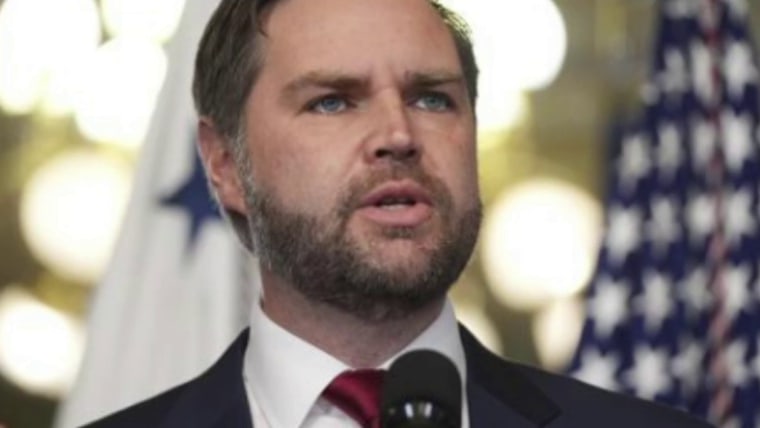
Officials in the state of Washington have agreed to water down a child abuse law after pressure from the Trump administration and local Catholic leaders.
Catholic bishops and the Trump administration had filed lawsuits seeking to overturn a bill signed by Washington Gov. Bob Ferguson, a Democrat and a Catholic, that required faith leaders of all denominations to report allegations of abuse they received in private religious settings — including confession. Though the Catholic Church has a documented history of enabling child sexual abuse, the sponsor of Washington’s bill said the legislation was inspired by reports of abuse within Jehovah’s Witness churches.
Catholic leaders have argued that being forced to report admissions made during a confession amounts to religious discrimination. And after a federal court temporarily blocked the law in July, Washington’s attorney general said late last week that the law will be pared back:
Clergy in Washington will remain mandatory reporters under stipulations filed today by the state Attorney General’s Office and the plaintiffs in lawsuits against the state over Senate Bill 5375. Under the stipulations, however, the state and county prosecutors have agreed — as the court ordered — not to enforce reporting requirements for information clergy learn solely through confession or its equivalent in other faiths. The stipulation now awaits approval by the court.
Most states have so-called clergy-penitent privilege laws that effectively shield religious leaders from having to report child abuse claims they hear in confessional settings. A 2022 report by Boston’s NPR station, WBUR, detailed how this loophole has protected churches from prosecutions and civil lawsuits from victims seeking accountability. Washington had sought to join the few other states without such protections.
In Washington, the governor had denounced the lawsuit filed by Catholic bishops in his state, with Ferguson saying that he was “disappointed my Church is filing a federal lawsuit to protect individuals who abuse kids.”
Jean Hill, executive director of the Washington State Catholic Conference, said in a statement last week that “preventing abuse and upholding the sacred seal of confession are not mutually exclusive — we can and must do both.”
The Dictatorship
Trump administration eyes higher food prices as a result of the immigration crackdown

About a month after Election Day 2024, as Donald Trump prepared to return to the White House, the Republican appeared on “Meet the Press” and explained his victory to NBC News’ Kristen Welker.
“I won on groceries,” he saidadding: “I won an election based on that.” Looking ahead, Trump concludedin reference to food prices for consumers: “We’re going to bring those prices way down.”
After returning to power, the president began boasting about his successes on the issue, assuring Americans that he had lowered the cost of groceries — despite the administration’s own data, which shows grocery costs have gone up this year, not down.
Complicating matters, the president’s own team fears that the problem will soon get worse, as a direct result of the Republican White House’s own agenda. The Washington Post reported:
The Trump administration said that its immigration crackdown is hurting farmers and risking higher food prices for Americans by cutting off agriculture’s labor supply. The Labor Department warned in an obscure document filed with the Federal Register last week that ‘the near total cessation of the inflow of illegal aliens’ is threatening ‘the stability of domestic food production and prices for U.S. consumers.’
According to the Labor Department’s assessment, which was first reported by The American Prospectthe administration needs to act “immediately” to prevent the problem from getting worse.
The Post’s report noted that Agriculture Secretary Brooke Rollins has predicted that, in the aftermath of Trump’s mass deportation agenda, the U.S. farm workforce will become “100% American.” Trump’s Labor Department doesn’t see that as realistic, since Americans lack the will and skills to replace migrant farmworkers.
“The Department concludes that qualified and eligible U.S. workers will not make themselves available in sufficient numbers,” the agency said.
In other words, the president who claimed that he won a second term based on food prices, and who vowed to bring consumer costs at grocery stores “way down,” is already lying about his recent record. But making matters even worse is the fact that his own administration expects the problem to get worse, as food production slows as a result of the White House’s campaign against immigrants, which is likely to reduce supply, pushing prices up.
At that point, Trump will have to choose between competing campaign promises: Will he let immigrants stay and help stabilize food costs, or will he deport these workers and risk the fury of consumers who’ll see prices at their local grocery store climb?
Steve Benen is a producer for “The Rachel Maddow Show,” the editor of MaddowBlog and an BLN political contributor. He’s also the bestselling author of “Ministry of Truth: Democracy, Reality, and the Republicans’ War on the Recent Past.”
-
Uncategorized11 months ago
Bob Good to step down as Freedom Caucus chair this week
-

 Politics8 months ago
Politics8 months agoFormer ‘Squad’ members launching ‘Bowman and Bush’ YouTube show
-

 The Josh Fourrier Show11 months ago
The Josh Fourrier Show11 months agoDOOMSDAY: Trump won, now what?
-

 The Dictatorship8 months ago
The Dictatorship8 months agoPete Hegseth’s tenure at the Pentagon goes from bad to worse
-

 The Dictatorship8 months ago
The Dictatorship8 months agoLuigi Mangione acknowledges public support in first official statement since arrest
-

 Politics8 months ago
Politics8 months agoBlue Light News’s Editorial Director Ryan Hutchins speaks at Blue Light News’s 2025 Governors Summit
-

 Politics11 months ago
Politics11 months agoWhat 7 political experts will be watching at Tuesday’s debate
-

 Politics8 months ago
Politics8 months agoFormer Kentucky AG Daniel Cameron launches Senate bid








